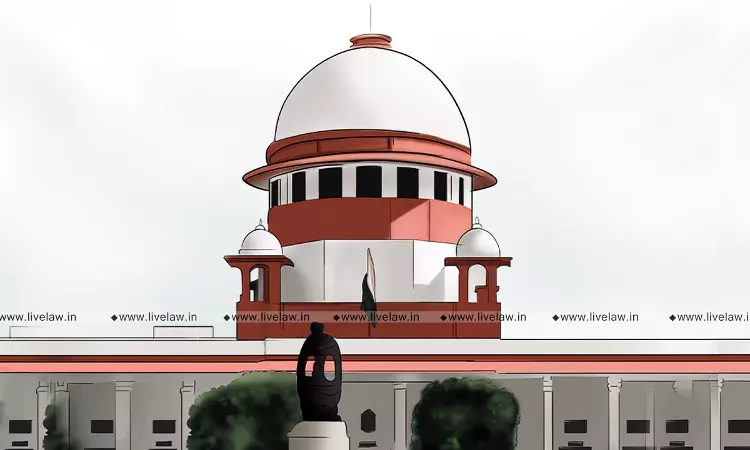- Home
- /
- Top Stories
- /
- Supreme Court Rejects Challenging...
Supreme Court Rejects Challenging Validity Of Rule 29(4) Copyright Rules Requiring Prior Notice For Statutory Broadcast Licence
Amisha Shrivastava
1 Jun 2025 12:05 PM IST
The Supreme Court rejected a plea challenging Rule 29(4) of the Copyright Rules, 2013, which sets out the specific particulars that broadcasters must include in the prior notice required for invoking the statutory licence under Section 31D of the Copyright Act, 1957.Section 31D provides for a statutory licence to broadcasters to communicate literary and musical works and sound recordings...
The Supreme Court rejected a plea challenging Rule 29(4) of the Copyright Rules, 2013, which sets out the specific particulars that broadcasters must include in the prior notice required for invoking the statutory licence under Section 31D of the Copyright Act, 1957.
Section 31D provides for a statutory licence to broadcasters to communicate literary and musical works and sound recordings without requiring prior individual licences from copyright owners, subject to conditions including prior notice (as per Rule 29(1)) of duration and territorial coverage, and royalty payment as determined by the commercial courts.
Rule 29(4) specifies the details such prior notice must contain. These particulars include: the name of the broadcasting channel, territorial coverage, details necessary to identify the work, year of publication, name, address and nationality of the copyright owner, names of the authors and principal performers, proposed alterations if any, mode of broadcast, name of the programme, details of the time slots and duration of the broadcast, royalty payment details, and the address where records of the broadcast will be maintained.
A bench of Justice Abhay S. Oka and Justice Ujjal Bhuyan found no merit in the constitutional validity challenge to Rule 29(4), and allowed the petitioner Next Radio Limited, which operates the radio network Radio One, to withdraw it.
“After having heard the learned senior counsel appearing for the petitioners, we find no merit at all in the constitutional validity challenge to Rule 29(4) of the Copyrights Rules, 2013”, the Court observed in the order passed in March.
Background
On 20 April 2022, the Madras High Court had dismissed the constitutional challenge to Rule 29(4), holding that the rule falls within the scope of Section 31 D of the Copyright Act, 1957 and does not violate any fundamental rights under the Constitution.
The petition before the High Court was filed by Next Radio Limited, the Association of Radio Operators for India, and Ramesh Menon. They sought a declaration that Rule 29(4) was “non est, void, unconstitutional and ultra vires” Section 31D of the Copyright Act, 1957, or alternatively that the provision be read as directory. The respondents included the Union of India, Saregama India Limited, Phonographic Performance Limited India, and Sony Music Entertainment Pvt. Ltd.
The petitioners contended that sub-clauses (c) – details necessary to identify the work, (d) – year of publication, (e) – name, address and nationality of the owner of rights, (f) – names of authors and principal performers of the work, and (j) – details of the time slot, i.e., the time and duration of the proposed communication to the public of the work, of Rule 29(4) went beyond Section 31D and placed unreasonable burdens on broadcasters. They argued that these requirements were not provided under the Act and were unfeasible for live or on demand programmes. The petitioners further submit that Rule 29(4) of the Rules of 2013 is violative of Article 19(1)(a) and (g) of the Constitution of India.
Union of India argued that Rule 29(4) supplemented Section 31D and did not conflict with it. It submitted that the requirements flowed from the statutory conditions and were necessary to maintain a balance between broadcasters and copyright holders.
UoI submitted that Section 31 D(5) already requires the disclosure of authors' and performers' names. Further, two provisos to Rule 29(1) permit broadcasters to give notice within 24 hours in unforeseen circumstances, such as work played on demand. It was argued that most broadcasts are scheduled in advance, making it possible to provide the required details. According to the Union of India, if Rule 29(4) were struck down, the statutory licence would become indistinguishable from the compulsory licence that existed earlier, undermining the purpose of Section 31 D.
Private respondents Saregama, PPL and Sony Music supported the Union's arguments. They contended that the petitioners had no practical difficulty in compliance and that the information was necessary for calculating advance royalty payments.
The Madras High Court upheld the validity of Rule 29(4), holding that the additional details it required were consequential to the Act and did not exceed its scope. The Court accepted the UoI's contention that the second proviso to Rule 29(1) allows broadcasters to give notice within 24 hours in unforeseen circumstances, covering the petitioners' concerns.
The Court rejected the petitioners' prayers to read the rule as directory and held that it did not violate fundamental rights under Articles 19(1)(a) or 19(1)(g) of the Constitution.
Having found no grounds to strike down or read down Rule 29(4), the Madras High Court had dismissed the writ petition. Next Radio challenged this judgment before the Supreme Court in the present SLP.
Case no. – Petition for Special Leave to Appeal (C) No. 14373/2022
Case Title – Next Radio Limited & Anr. v. Union of India & Ors.



